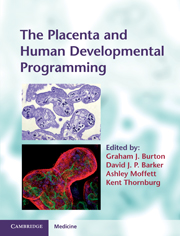
-
Select format
-
- Publisher:
- Cambridge University Press
- Publication date:
- February 2011
- December 2010
- ISBN:
- 9780511933806
- 9780521199452
- Dimensions:
- (246 x 189 mm)
- Weight & Pages:
- 0.74kg, 258 Pages
- Dimensions:
- Weight & Pages:
You may already have access via personal or institutional login
Book description
Developmental programming is a rapidly advancing discipline of great importance to basic scientists and health professionals alike. This text integrates, for the first time, contributions from world experts to explore the role of the placenta in developmental programming. The book considers the materno-fetal supply line, and how perturbations of placental development impact on its functional capacity. Chapters examine ways in which environmental, immunological and vascular insults regulate expression of conventional and imprinted genes, along with their impact on placental shape and size, transport, metabolism and endocrine function. Research in animal models is integrated with human clinical and epidemiological data, and questions for future research are identified. Transcripts of discussions between the authors allow readers to engage with controversial issues. Essential reading for researchers in placental biology and developmental programming, as well as specialists and trainees in the wider field of reproductive medicine.
Reviews
"This is comprehensive reference highlighting placental growth and its role in fetal and human development. The placenta is an often overlooked and misunderstood organ and the authors do an admirable job of discussing the complex mechanisms involved in its regulation. The book is aesthetically pleasing."
--Doody's Review Service
Contents
Metrics
Full text views
Full text views help Loading metrics...
Loading metrics...
* Views captured on Cambridge Core between #date#. This data will be updated every 24 hours.
Usage data cannot currently be displayed.
Accessibility standard: Unknown
Why this information is here
This section outlines the accessibility features of this content - including support for screen readers, full keyboard navigation and high-contrast display options. This may not be relevant for you.
Accessibility Information
Accessibility compliance for the PDF of this book is currently unknown and may be updated in the future.


